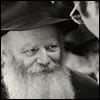
It was during the Shemini Atzeret dancing in 1977 that the Rebbe, of righteous memory, had a heart attack. Suddenly, the Rebbe's face turned ashen and, standing beside his chair, he grabbed it and sat down.
Somebody approached the Rebbe, inquiring about his condition, and sparse words were communicated between them. The Rebbe, in general, was not very forthcoming about his personal needs. He indicated that the singing and dancing should continue. As customary, the Rebbe descended the podium and danced with his brother-in-law, Rabbi Shmaryahu Gurary. After the dancing ended, the Rebbe went up to his office, walking the steps alone. He refused support from anyone.
Four doctors, from Cleveland, Toronto, Manhattan and Brooklyn, who had come to Crown Heights to spend the holiday with the Rebbe, were called together in order to treat the Rebbe's still-undiagnosed condition.
The doctors decided they'd sedate the Rebbe and take him to a hospital. Just that moment, the Rebbetzin came walking down from upstairs. The doctors told the Rebbe to eat something, and he responded that he'd make Kiddush over wine, but would need to do it in the sukkah outside. We were all in the sukkah when the Rebbe's wife, Rebbetzin Chaya Mushka, arrived from her home. She was relaxed and calm, as was her nature. The Rebbe made Kiddush and ate some food. He returned to his office, and a bed was brought in so he could rest.
The four doctors decided that the Rebbe had had, in all probability, a heart attack, but without proper medical equipment, they could not treat it. Several well-known cardiologists, from Brooklyn, Manhattan and Long Island, were called.
They began arriving at Lubavitch World Headquarters sporadically around 11:30 p.m. Each one confirmed that it was not only a heart attack, but a serious and massive one. They all opined that the Rebbe must be admitted to a hospital, but the Rebbe refused.
The doctors replied that they would not treat him outside a hospital, and they all left.
Some equipment was acquired, and we began monitoring the Rebbe's heart rhythm. Around 5 a.m., the Rebbe's heartbeat became irregular, a potential fatal complication. We were completely unsure of what to do. We could not take the Rebbe by force if he'd refused hospitalization.
The doctors decided they'd sedate the Rebbe and take him to a hospital. Just that moment, the Rebbetzin came walking down from upstairs.
"What is the commotion about?" she asked.
She replied, "All the years that I know the Rebbe, there was never an instant that he was not in total control of himself." The doctors explained that the Rebbe's condition was life-threatening, hospitalization was imperative, and explained the plan they'd just devised.
She replied in Yiddish (paraphrased), "All the years that I know the Rebbe, there was never an instant that he was not in total control of himself. I cannot consent to sedating him and forcing him to go to the hospital."
It was incredibly courageous.
I went into the secretariat's office across the hall and she entered after me. She said, "Rabbi Krinsky, you know so many people. Can you not find a doctor for my husband?"
Suddenly, I remembered a young cardiologist, Dr. Ira Weiss from Chicago, who once sent the Rebbe a book he had authored on arrhythmia. I decided to call him at once, as the Rebbe's situation was not improving. It was 6 a.m. when I woke him. I explained the situation and he replied that if the Rebbe didn't want to go to the hospital, we should not take him against his wishes. Psychologically, it could be very damaging. He promised to get onto the next plane to NY, and in the interim, we should contact Dr. Louis Teichholz from New Jersey, head of cardiology at Mt. Sinai Hospital.

Teichholz arrived at 11:30 with a police escort. Dr. Weiss came in from the airport around a half hour later, also with a police escort. They consulted with each other, and soon began treating the Rebbe. By 2 p.m., the situation was stabilized.
The next morning, the Rebbe prayed morning services in his room, and was called up to the Torah during the Torah reading.
Having been with the Rebbe the entire time, I can affirm that we never heard from him even one complaint about his situation.
Dr. Weiss stayed for two and a half weeks; he slept on the floor and didn't leave the Rebbe's side. (Click here to read Dr. Weiss's account of the medical miracle.)
Though the Rebbe had suffered a grave heart attack, it was not just a single letter to the small boy that he responded to (click here to read the story); the world did not stop, people needed advice and blessings, and the Rebbe heeded the call.






